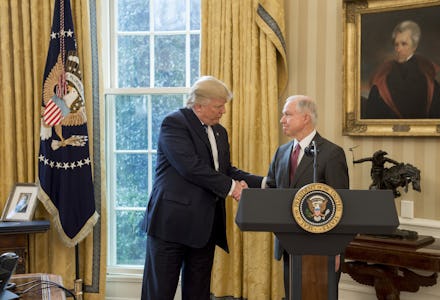Here is a timeline of Donald Trump’s relationship with Jeff Sessions

President Donald Trump once again slammed Jeff Sessions on Twitter Wednesday — reportedly while the embattled attorney general was attending a routine meeting in the White House.
“Why didn’t A.G. Sessions replace acting FBI Director Andrew McCabe, a Comey friend who was in charge of Clinton investigation but got big dollars ($700,000) for his wife’s political run from Hillary Clinton and her representatives,” Trump tweeted. “Drain the Swamp!”
Trump has been publicly attacking Sessions since last week, when he said during an interview with the New York Times that he never would have appointed him attorney general had he known he’d recuse himself from matters related to the Russia investigation. He’s continued to blast Sessions since on everything from his recusal to his frustration with the attorney general for not investigating Clinton — something Trump himself said he would not do — in what many see as an attempt to get Sessions to resign.
That’s essentially locked him into a game of chicken with Sessions, who has said that he plans to continue as attorney general — a position the Department of Justice has reiterated in recent days.
A timeline of Trump’s relationship with Sessions
Things weren’t always this way between Trump and Sessions.
Then-Sen. Sessions was an early backer of Trump, donning a Make America Great Again hat at a February 2016 rally in Alabama and endorsing the reality TV star’s unlikely candidacy.
“We need to make America great again,” Sessions said. “I am pleased to endorse Donald Trump for the presidency of the United States. I believe a movement is afoot that must not fade away. It has the potential to have the American people’s voices heard.”
Sessions — a hardliner on immigration — had been signaling his support for Trump for months, after telling Trump at an August 2015 campaign stop that he was “really impressed” with his plans on immigration.
“I know it will make a difference and this crowd shows a lot of people agree with that,” Sessions said in Mobile, Alabama.
After becoming the first sitting senator to endorse Trump, Sessions was appointed chair of the Trump campaign’s national security council. He was one of Trump’s most vocal supporters — and had even been floated as a possible running mate. In May 2016, Trump called the Alabama senator a “fantastic person” and “certainly someone I would consider” to fill out the ticket.
Sessions served as a Trump delegate at the 2016 Republican National Convention, where the reality star-turned-politician became the GOP nominee for the presidency.
In November, days after defeating Clinton for the presidency, Trump appointed Sessions as his attorney general.
“Jeff has been a highly respected member of the U.S. Senate for 20 years,” Trump said in a news release. “He is a world-class legal mind and considered a truly great attorney general and U.S. attorney in the state of Alabama. Jeff is greatly admired by legal scholars and virtually everyone who knows him.”
Despite fierce opposition from critics of his troubling history of alleged racism, Sessions was confirmed as attorney general in February. But Sessions quickly came under fire when it was revealed that he had spoken twice with Russian ambassador Sergey Kislyak during the 2016 race — even though he said under oath that he had not.
Facing accusations of perjury, Sessions was called on to resign or recuse himself by lawmakers on both sides of the aisle — but Trump stood by him, saying he had “total” confidence in the attorney general and stating that he did not believe he should have to recuse himself.
But a day after his Kislyak meetings were reported, Sessions announced he would recuse himself from matters relating to the Russia investigations.
That apparently has been a sticking point for Trump, who told the New York Times last week that he viewed the recusal as “extremely unfair” to him personally and seemingly blamed his decision for the appointment of special counsel Robert Mueller.
“If he would have recused himself before the job, I would have said, ‘Thanks, Jeff, but ... I’m not going to take you,’” Trump told the paper. “It’s extremely unfair — and that’s a mild word — to the president.”
Trump has continued to blast Sessions since, calling him “weak” and faulting him for not investigating Clinton and being soft on leaks.
“I am disappointed in the attorney general,” Trump said in a news conference Tuesday afternoon.
The repeated attacks on Sessions have been criticized by members of Trump’s own party, including Sen. Lindsey Graham (R-S.C.), who said the president is demonstrating “weakness” in seemingly attempting to bully the attorney general into quitting rather than firing him.
But Trump won’t say either way if he plans on terminating Sessions, saying only that “time will tell.” Firing Sessions could amount to a “constitutional crisis,” Sen. Al Franken (D-Minn.) warned.
On Wednesday, it was reported that Sessions will launch more leak investigations, seemingly in a bow to Trump. But Trump and Sessions are apparently not on speaking terms, and the president has reportedly been considering possible replacements — including Rudy Giuliani.
How bad has the relationship between Trump and Sessions gotten?
So bad that Trump on Tuesday dismissed Sessions’ loyalty as opportunism.
“When they say he endorsed me, I went to Alabama. I had 40,000 people. He was a senator from Alabama. I won the state by a lot, massive numbers. A lot of the states I won by massive numbers. But he was a senator, he looks at 40,000 people and he probably says, ’What do I have to lose?’ And he endorsed me,” Trump told the Wall Street Journal. “So it’s not like a great loyal thing about the endorsement.”